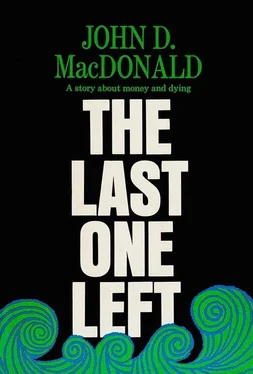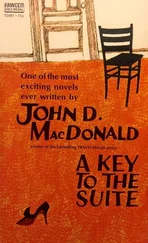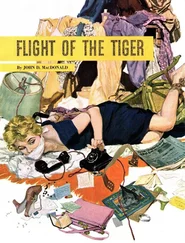The second incident occurred when a small corporation in San Antonio, engaged in a proxy battle, had engaged him to find out how all their strategies became known before they could put them into effect, and what charges they might bring against the raider.
By employing another firm of investigators, a branch office of a national organization which made much of the number of ex-FBI agents they employed, he learned that the internal security had been penetrated in an unusual manner. An expert had imbedded a sensitive and shock-resistant induction mike and transmitter into a ball of sticky putty-colored material the size of an English walnut, and from outside the security fence, at night, had used a sling shot to paste it against an upper panel of one of the third floor windows of the conference room where, every morning, the executive committee of the Board of Directors met. The transmitter had a thirty-six hour life, and the substance in which it was imbedded took about the same amount of time to dry out and fall from the pane. The tape recorder, voice activated so that no attendant was necessary, had been placed along with the receiver in the store room of a diner well within the five-hundred-yard range of transmittal. Realizing the difficulties of taking legal action, Sam had recommended that the executive committee meetings be continued in such a way as to provide information that would seem valid but would mislead the opposition, and that the actual battle plans be arranged in secret meetings off the plant premises.
To protect himself professionally against this ever more sophisticated electronic invasion, Sam had employed the agency to give him a thorough grounding in the advanced techniques, and had also contracted to have his offices “swept” from time to time at random intervals to determine if any devices had been planted therein.
The third incident was far more subjective. It happened after Lydia Jean had been gone from home for two months, living with their boy in Corpus. And one night as he was going to bed, he had the sudden thought of how easy it would be to employ an agency to install phone taps and keep track of her movements and make regular reports. He knew that the thought was not as sudden as it seemed. It had that special flavor of thoughts which lie on the floor of the mind for a long time before emerging into the conscious mind.
It was a wretched idea. If she could not be trusted, there could be little point in yearning for her to come home. If she learned he could do that to her, his chances of ever getting her back were that much less. As he discarded the idea, he realized that ever since he had learned of the new marvels in electronic espionage, he had been gradually accustoming himself to speak less openly to everyone in his own offices and in those he visited. He had thought of it as merely a sensible precaution. If one assumed everything was overheard and recorded, one could cease worrying about what might be safe to say. It made a life more drab, more guarded, more ceremonious. All men of any degree of responsibility had begun to speak for the record, for the unseen audience, and old intimacies had withered because closeness must depend upon the exchange of the innermost thoughts. Orwell, in 1984 , had not considered the consequences of such a diffusion. An ever-watchful Big Brother could be outwitted, but a gnat-throng of little brothers could only be endured. Miniaturization of electronic circuitry was effecting that great change in human relationships which, in other cultures, had been created only by using secret arrest, imprisonment and torture to turn brother against brother.
He got behind the wheel of his rental car, but before he could start the engine, another of those strange spasms of grief and loss squeezed and twisted his brain and his heart. Chin on chest, eyes tightly shut, he grasped the steering wheel with such strength it numbed his hands and started a tremor in his arms and shoulders. It was more like a combination of terror and anger than like a sense of loss. During those few moments when it was most intense, the three women of his life merged into a single entity, something which was sister-dead, wife-lost, mother-dead, fading swiftly, leaving him to stand chilled and alone, like a small figure in a barren landscape in an old book.
He came out of it and, as before, found that the spasm had dulled and slowed his mind. Daylight had a cinematic unreality, and he had to reconstruct the schedule he had set himself, putting each errand into its proper place, like stacking tumbled blocks of great weight.
When Sam Boylston returned to the Nassau Harbour Club there was a message for him to call a Mr. Cooper at a number in Austin. Yandell Binns Cooper, known throughout the southwest as Stuff Cooper, father of Carolyn, Bix Kayd’s second wife. Sam returned the call and braced himself for the force and weight of Stuff’s imperative personality.
But after the secretaries had put him through, Cooper sounded vague and mild. And old. “Sam? Sam, boy, I tracked you down through your office. Is it like all the papers and television got it?”
“I’m afraid it is, Mr. Cooper.”
“Damn all! Ever’ one of ’em, eh? All the time I was thinking it was some kind of thing ol’ Bix was pulling. Everybody knowed he was upsot having to let go too much of that Bee-Kay stock a couple years back. What I figured it for, he wanted to turn up missing so as some of his people could buy it in cheap. Thursday it had fell off to eleven something and I picked up some on a hunch. When he calls me back I know what my broker man is going to tell me, he can’t find any takers noplace. Damn over-the-counter stuff. Sam?”
“I’m here, Mr. Cooper.”
“Sam, I can’t believe it. I keep on seeing her. She had that special smile for her daddy. I keep on seeing Carrie the way she was when they made her queen for that bowl game, way up on the float, all them flowers, ruffly dress, holding that boo quet, a-wavin’ and smilin’. It ain’t right, boy. You know that.”
“I know it.”
“And that pretty little sister of yours, and those kids of Bix’s from before. I didn’t want her to marry Bix. Hell, he’s only five years younger’n her daddy. You know what I wanted, boy. I made it clear enough. When you and Carrie were going together.”
“I know. It just didn’t work out, Mr. Cooper.”
“I keep thinking she’d be alive if they had. You can’t blame me for that now. Lydia Jean is as sweet as they come for sure. Maybe a better wife than Carrie would have made you. What she wanted most, I guess, was being the wife of a big man, so she could go in any store and they’d all jump and come running up, rubbing their hands and smiling. I told her one time that was just what she’d get with you. It would mean waiting a little spell, that’s all. You’ve been proving me right, boy. I’m glad for you, but it don’t help much right now. You about to head on back?”
“Pretty soon I guess.”
“You being a lawyer I guess you can imagine what kind of a mess it’s going to be for a long long time. It wasn’t just Bix not letting his right hand know what his left hand was doing. He was more like that Hindu gal they got statues of, three or four arms growing out of each shoulder, and not one of them hands knowing what any other of the hands was up to. Everybody connected with him in any business way is plain scrambling right now, like trying to run acrost the front of a landslide. He’d set up his private affairs pretty complicated too, from a couple things Carrie told me. All kind of insurance trusts and residuary trusts and holding corporations and foundations and so on. I bet he covered every possible contingency except a common disaster where him and Carrie and Stella and Roger all passed on at one and the same time. I bet you the state boys and the feds and the lawyers don’t get it all unwound for twenty years and more. Sam?”
Читать дальше






![Джон Макдональд - Wine of the Dreamers [= Planet of the Dreamers]](/books/430039/dzhon-makdonald-wine-of-the-dreamers-planet-of-thumb.webp)




![Джон Макдональд - The Hunted [Short Story]](/books/433679/dzhon-makdonald-the-hunted-short-story-thumb.webp)
